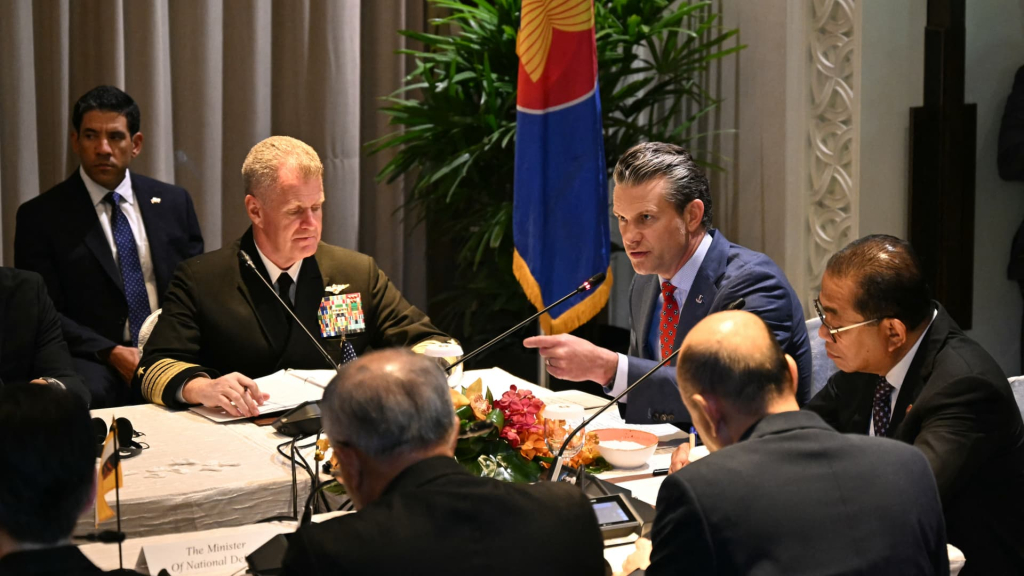SINGAPORE — During the Shangri-La Dialogue held on Saturday, U.S. Defense Secretary Pete Hegseth declared that the United States is ready to “fight and win” against China should efforts at deterrence fail. He urged Asian allies to enhance military collaboration and increase defense expenditures.
In his address at the annual defense summit, Hegseth highlighted Washington’s commitment to fortifying its defense capabilities amidst escalating global military conflicts, including Russia’s ongoing aggression in Ukraine and the violence in Gaza.
Emphasizing the U.S.’s dedication to the Indo-Pacific region, Hegseth noted the conspicuous absence of China’s defense minister from the summit, remarking, “We are here this morning. Somebody else isn’t.”
The Defense Secretary called upon political and military leaders to act swiftly in responding to China’s growing military assertiveness in the South China Sea and surrounding Taiwan. “China has shown its intention to fundamentally change the status quo in the region. We cannot ignore this; China’s actions are a clear signal for action,” stated Hegseth.
He insisted that allies and partners must step up their defense efforts, emphasizing that “our defense expenditures must match the threats we face today, as deterrence comes at a cost.”
This forceful rhetoric unfolds against a backdrop of mounting trade tensions between the U.S. and China, as optimism fades regarding a potential agreement following a recent ceasefire on tariffs.
U.S.-China trade negotiations are currently “a bit stalled,” prompting Treasury Secretary Scott Bessent to suggest that the leaders of both nations should intervene, as he indicated in a recent interview with Finance Newso News.
Hegseth continued by addressing China’s maneuvers in the South China Sea, which threaten both sovereignty and the freedom of navigation, and indicated that military activities near Taiwan demonstrate a clear resolve to heighten pressure on the island. He reaffirmed the U.S. commitment to enhance security in the region, specifically targeting China’s “malign” influence around the Panama Canal, a strategic asset the U.S. built and will protect against potential Chinese control.
In March, China signaled its readiness for “any type of war” with the U.S. amidst rising tensions, asserting through its embassy that if war is what the U.S. seeks—whether tariff-related, trade-related, or otherwise—China stands ready to fight.
China skips top security forum
This year’s summit marked a notable absence as China’s Defense Minister Dong Jun did not attend, breaking a pattern observed since 2019. Instead, Beijing dispatched a lower-level delegation, led by Major General Hu Gangfeng, Vice President of National Defense University’s People’s Liberation Army.
Major General Hu is expected to engage in a dedicated session on cooperative maritime security in the Asia-Pacific later on Saturday.
Dong’s absence raises questions about future bilateral discussions between Chinese and U.S. defense officials, a concern highlighted by last year’s meeting between former U.S. Defense Secretary Lloyd Austin and Dong, where they agreed to maintain military communication.
Experts suggest that Beijing’s decision to forgo sending its top military official might be a strategy to avoid confrontational dialogues with the U.S. regarding contentious issues such as Taiwan and the South China Sea. “Beijing prefers to control the narrative. Shangri-La does not allow for that,” commented Drew Thompson, a senior fellow at RSIS Rajaratnam School of International Studies and a former U.S. Defense Department official.
Wu Xinbo, director of the Center for American Studies at Fudan University, noted that Beijing sees limited strategic value in having its top defense officials attend international forums dominated by U.S. presence, instead opting to strengthen ties through alternative channels.
Taiwan issue
The U.S. government is reportedly planning to increase arms sales to Taiwan to exceed the $18.3 billion authorized during the Trump administration, which is more than the $8.4 billion approved under President Biden, as reported by Reuters.
The intended arms packages are set to include cost-effective military systems such as missiles, munitions, and drones, as part of broader efforts to enhance Taiwan’s defense capabilities in light of increased pressure from Beijing on the self-ruled island.
For decades, the U.S. has been a crucial ally and arms supplier to Taiwan, while Beijing has continually urged Washington to cease its military support and to stop escalating tensions in the Taiwan Strait.
Claiming Taiwan as part of its territory, China has vowed to “reunify” with the island, potentially using force if necessary. The Taiwanese government, however, firmly rejects Beijing’s sovereignty claims.
In recent years, China has increased military pressure regarding its claims over Taiwan, frequently sending aircraft and naval vessels into the area. Dong, at last year’s Shangri-La Dialogue, issued a stark warning that any forces aiming to separate Taiwan from China would face “self-destruction,” reiterating that the Taiwan issue is “the core of our core interest.”
Amid these tensions, concerns have also been raised regarding Trump’s commitment to the island, with his campaign rhetoric suggesting that Taiwan should financially contribute to U.S. defense, causing alarm among officials in Taipei.


























